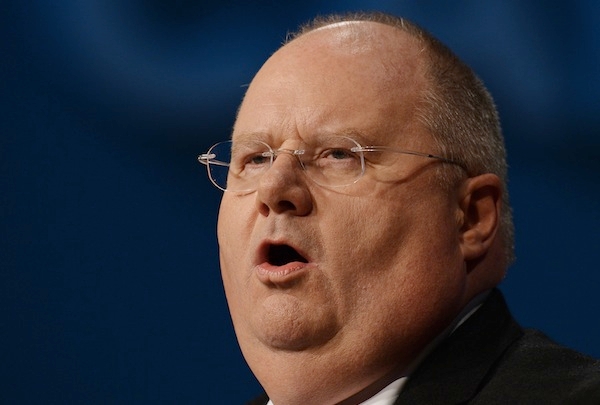Personally, I don’t wear a cross, on the basis that I’m not much of an advertisement for Christianity and I’d risk diminishing the brand. But for Eric Pickles, Communities Secretary, and Nadia Eweida, the former British Airways employee who has just won her appeal about cross-wearing at work at the European Court of Human Rights, it’s a basic freedom.
It’s hard to gainsay the judges’ view that manifesting your faith is a ‘fundamental right’. Any organisation that doesn’t have a problem about Muslim women wearing scarves and Sikh men wearing turbans but which gets uppity about a small cross, really does have a problem with consistency. As Pickles says, the symbol should be ‘discreet’, and as he didn’t say but the judges did, it shouldn’t pose a health and safety issue, which is presumably why they threw out a Christian nurse’s bid similarly to wear a cross at work, but otherwise it’s a no-brainer.
But what a useful man Pickles is. At the same time as the government lawyers were fighting at taxpayers’ expense to oppose Eweida’s appeal, he was preparing to sound off to British Future and Policy Exchange about how the Government does ‘do God’. Traditional freedoms, he maintains, are under threat from the ‘intolerance of aggressive secularism’. Fine, except that some of that intolerance is either sanctioned by government or promoted by it. I’ll get onto that later.
But he’s a sort of lightning conductor, is Pickles. If you’re a Tory voter who feels that the relationship between Westminster and Brussels is lopsided, why, the Communities Secretary feels just the same. If you’re worried about the impact of EU expansion on immigration and housing, well, Pickles is there too. From dustbin collections to saying prayers in council meetings, Pickles can be relied on to express the concern of normal voters, even while the government he’s part of goes on just as it did before.
My own rapture about the ECHR ruling about cross wearing is modified by the fact that the other cases before it were thrown out. One of them was Gary McFarlane, a Relate councillor who has a problem about providing gay people with relationship counselling, and Lillian Ladele, a registrar who didn’t want to conduct civil partnership ceremonies and who would, presumably, have even bigger problems presiding over gay marriages. They argued that their stance made them conscientious objectors. Ladele’s lawyers argued that employers should be required to make ‘reasonable accommodation’ for minority beliefs.
And that seems just to me. No one has ever suggested that in an organisation the size of Relate or in any register office there aren’t several employees, most of whom wouldn’t have a problem taking the clients that conscientious objectors turn down. In the NHS, obstetrics departments might not go out of their way to employ people with moral objections to abortion, but those who in conscience refuse to carry out terminations are covered by colleagues with no scruples on the matter. Where’s the difference?
Granted, an organisation cannot function if employees cherrypick endlessly about whom they are, or are not, prepared to provide a service for; the bar for moral objection must be set high. But if an individual does feel that homosexual civil partnerships are not in the interests of society, or may in themselves be morally problematic, that isn’t an offbeat individual view; it’s one that was widely held until about 15 minutes ago and is still held by mainstream faiths.
The UK equality law explicitly forbids denying goods or services to people on grounds of sexuality, and that’s because it was enacted by a Labour government with the support of prominent Tories, chief among them, David Cameron and George Osborne. One of the consequences of that well-intentioned law was that reputable Catholic adoption agencies were simply put out of business for discriminating in favour of married couples as adoptive parents.
It would have been possible for the Tories to have pressed for an amendment to ensure the act didn’t treat adoption in the same way as the provision of insurance and which exempted religious bodies from its provisions in some areas, but they chose not to. With that record, it’s hard, wouldn’t you say, to take Pickles entirely seriously when he declares that Tories are, in general, on the side of faith?







Comments